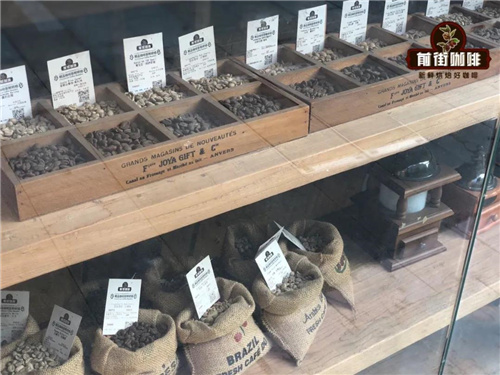How to avoid caffeic acid to relieve stomach discomfort after drinking coffee
Coffee is one of the most popular drinks in the world.
It can not only make you feel more alert, but it may also provide many other benefits, including improved emotional, mental and sports performance, as well as a reduced risk of heart disease and Alzheimer's disease. But some people find that drinking coffee affects their digestive system. After drinking coffee, the stomach will keep growling, and the stomach will be uncomfortable. Why is this?

Today Qianjie will discuss with you the reason why coffee makes your stomach uncomfortable.
Coffee contains a variety of compounds that may upset your stomach.
Caffeine is a natural stimulant in coffee that helps you stay alert.
Coffee contains a variety of compounds that may upset the stomach, such as caffeine and caffeic acid. In addition, common additives such as milk, cream, sugar or sweeteners may also upset your stomach.
An 8-ounce (240 ml) cup of coffee contains about 95 milligrams of caffeine.
Although caffeine is a powerful mental stimulant, studies have shown that it can increase the contraction frequency of the entire digestive tract. For example, an earlier study in 1998 found that caffeinated coffee stimulated the colon 23% more than decaffeinated coffee and 60% more than water. This suggests that caffeine can significantly stimulate your lower gut.
In addition, some studies have shown that caffeine may increase the production of stomach acid, which may upset your stomach if it is particularly sensitive.
Caffeic acid

Although caffeine is generally thought to be the cause of stomach problems caused by coffee, studies have shown that caffeic acid may also play a role.
Coffee contains many acids, such as chlorogenic acid and N-alkyl-5-hydroxytryptamine, which have been shown to increase the production of stomach acid. Stomach acid helps break down food so that it can pass through your intestines. In other words although some people have reported that coffee may aggravate heartburn the study is inconclusive and does not show a significant link.
Other additives
In some cases, coffee is not the cause of your stomach discomfort.
In fact, stomach discomfort may be caused by additives such as milk, cream, sweeteners or sugar, which are added to their coffee by more than 2/3 of Americans
Does decaffeinated coffee upset your stomach?
In some cases, switching to decaf may help relieve stomach discomfort.
This applies mainly to situations where caffeine is the leading cause of stomach problems.
In other words, decaffeinated coffee still contains caffeic acids, such as chlorogenic acid and N-alkyl-5-hydroxytryptamine, which are associated with increased gastric acid production and intestinal contraction. In addition, adding milk, cream, sugar or sweeteners to decaffeinated coffee may cause stomach problems in people who are sensitive to these additives.
Tips to avoid stomach discomfort
If you find that coffee makes your stomach uncomfortable, there are a few things that can reduce its effect so that you can enjoy a cup of coffee. First of all, taking a sip of coffee may make your stomach more comfortable. In addition, try to avoid drinking coffee on an empty stomach. Coffee is thought to be acidic, so drinking it with food can ease its digestion.
Here are several other ways to reduce the acidity of coffee:
Choose a deeper baking degree. Coffee beans that roast longer and at higher temperatures have lower acidity, which means that coffee beans roasted deeper tend to have lower acidity than those roasted lightly, a study has found.
Try cold extract | iced coffee. Studies have shown that the acidity of cold coffee is lower than that of hot coffee.
Choose a thicker degree of grinding. A study found that smaller coffee powder may extract more acid during the extraction process.
In addition, if you like coffee with milk, but are lactose intolerant or feel uncomfortable with milk, try switching to plant-based milk substitutes, such as soy milk or almond milk.
Although coffee contains a variety of compounds that may upset your stomach. This includes caffeine, caffeic acid and other additives such as milk, cream, sugar and sweeteners. In addition to caffeine, many of these compounds are also found in decaffeinated coffee.
Important Notice :
前街咖啡 FrontStreet Coffee has moved to new addredd:
FrontStreet Coffee Address: 315,Donghua East Road,GuangZhou
Tel:020 38364473
- Prev

How long can the method of making cold-extracted coffee be preserved? why is cold-extracted coffee better and healthier?
You are probably already in love with cold coffee, and if so, you may consider trying to make iced coffee at home. Now there is so much information about cold-extracted coffee formula on the Internet, which confuses a lot of coffee rookies and has a lot of misunderstandings about cold-extracted coffee. If you want to unveil the cold coffee today, you should take a closer look at the following introduction. Qianjie will show you
- Next

What is the difference between iced coffee making method and cold coffee extraction method
What is cold coffee? Iced coffee is a system that uses three cups (usually). Chances are you've seen ice cubes as centerpieces in coffee shops, not only because they look great but because they're one of the most popular ways to extract. Of course, in order to meet the needs of making iced coffee at home, ice drip pots have been designed in many models suitable for families.
Related
- Detailed explanation of Jadeite planting Land in Panamanian Jadeite Manor introduction to the grading system of Jadeite competitive bidding, Red bid, Green bid and Rose Summer
- Story of Coffee planting in Brenka region of Costa Rica Stonehenge Manor anaerobic heavy honey treatment of flavor mouth
- What's on the barrel of Blue Mountain Coffee beans?
- Can American coffee also pull flowers? How to use hot American style to pull out a good-looking pattern?
- Can you make a cold extract with coffee beans? What is the right proportion for cold-extracted coffee formula?
- Indonesian PWN Gold Mandrine Coffee Origin Features Flavor How to Chong? Mandolin coffee is American.
- A brief introduction to the flavor characteristics of Brazilian yellow bourbon coffee beans
- What is the effect of different water quality on the flavor of cold-extracted coffee? What kind of water is best for brewing coffee?
- Why do you think of Rose Summer whenever you mention Panamanian coffee?
- Introduction to the characteristics of authentic blue mountain coffee bean producing areas? What is the CIB Coffee Authority in Jamaica?

